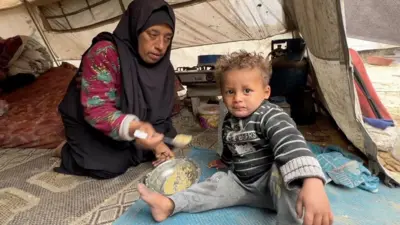We've updated our Privacy and Cookies Policy
We've made some important changes to our Privacy and Cookies Policy and we want you to know what this means for you and your data.
Yemen war: Surge in cholera outbreak kills 34 - WHO
Image source, Reuters
Top Stories
A resurgence of a cholera outbreak in war-torn Yemen is believed to have killed 34 people in the past two weeks.
The World Health Organisation says 2,022 suspected cases of cholera and acute watery diarrhoea (AWD) were reported between 27 April and 7 May.
Some 26,000 people have now been affected since October by the outbreak, which subsided over the winter.
The country's health system and civilian infrastructure are collapsing after two years of conflict.
The WHO fewer than 45% of health facilities are fully functioning, with almost 300 damaged or destroyed in fighting between forces loyal to President Abdrabbuh Mansour Hadi - who is backed by a Saudi-led multinational coalition - and those allied to the Houthi rebel movement.
Top Stories
More than eight million people also lack access to drinking water and sanitation.
A WHO spokesman said recent heavy rains had washed away piles of uncollected waste into wells and water sources. In addition, warmer weather is creating a favourable environment for the pathogens that cause cholera to spread.
Cholera is a water-borne disease that is transmitted through contaminated water and food. Symptoms include acute diarrhoea and vomiting. People ill with cholera can become very sick and, when it is left untreated, death can occur within hours.
Top Stories
Image source, Reuters
MГ©decins Sans FrontiГЁres (MSF), which has set up cholera treatment centres within five hospitals to isolate and treat patients presenting symptoms and is supporting other facilities, fear that the local health authorities alone would not be able to deal with the surge in cases.
"We are very concerned that the disease will continue to spread and become out of control," warned the charity's head of mission in Yemen, Shinjiro Murata.
Mr Murata said humanitarian assistance needed to be scaled up urgently.
Image source, EPA
The WHO spokesman said preventing the spread of the outbreak was a high priority and that it was co-ordinating efforts "with all parties to ensure an effective and rapid response".
The UN more than 8,010 people - mostly civilians - have been killed and close to 44,500 others injured since the conflict in Yemen escalated in March 2015.
The fighting has also left 18.8 million people in need of humanitarian assistance.
Top Stories
More to explore
Most read
Content is not available








